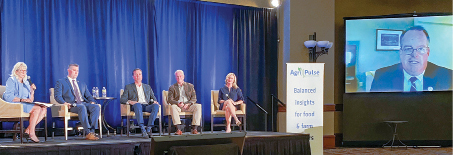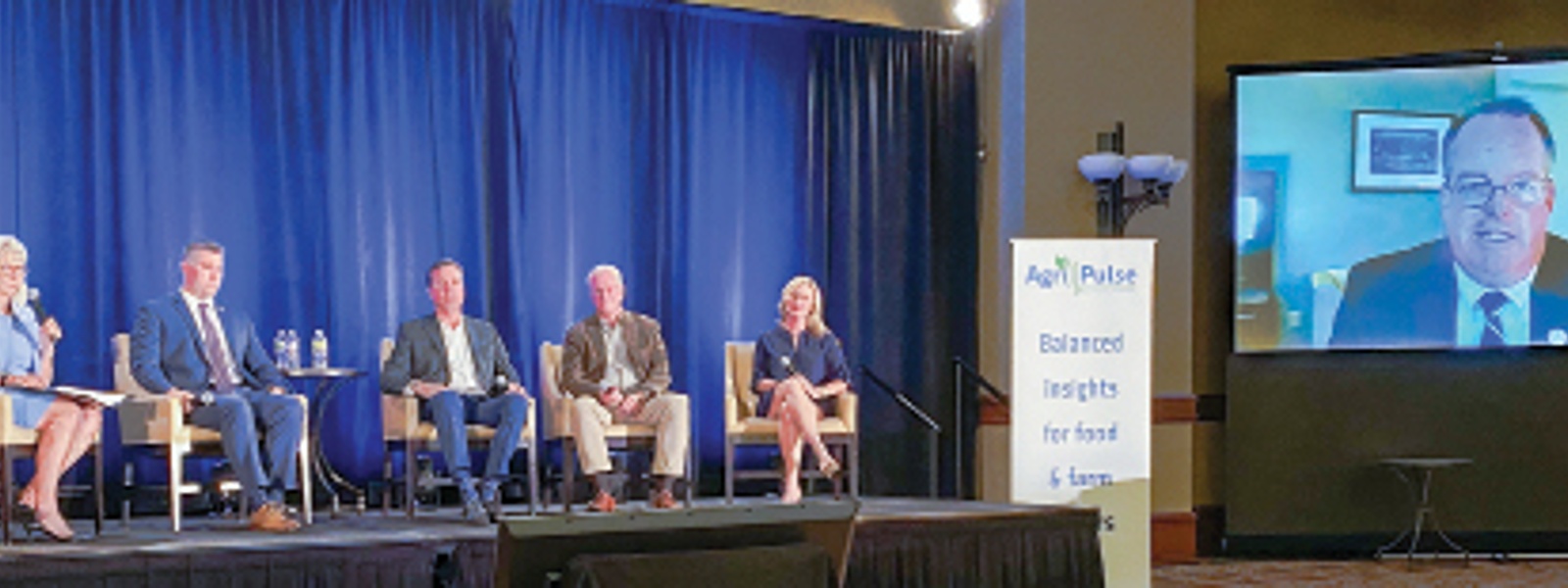Food and farming forum focuses on times of scarcity

Joining virtually from Washington, D.C., California Farm Bureau President Jamie Johansson speaks during the Food Ag Summit West.
Photo/Kevin Hecteman

Issue Date: July 20, 2022
By Kevin Hecteman
California's horn of plenty has become a horn of plenty of issues, prompting many leading minds of California agriculture to meet under one roof to hash out ideas.
At a July 11 agriculture summit in Sacramento, Jamie Johansson, president of the California Farm Bureau, named drought, inflation and supply-chain issues as among the top problems facing his membership. He also identified a paradox facing farmers and ranchers.
"We know that consumers want us to be more sustainable, our buyers do, but we know we have to intensify our production," Johansson said, noting it was not long ago that stores had to limit how much milk shoppers could buy.
Johansson offered his observations as part of a panel convened at the Food & Ag Issues Summit West. The summit was presented by Agri-Pulse, with California Farm Bureau among the top sponsors.
"What we're being asked to do as farmers is really manage scarcity," said Johansson, who appeared virtually from Washington, D.C., where he was meeting with state and national Farm Bureau presidents. "How are we going to farm when we're given less—whether that's surface water and groundwater, whether that's the pesticides we can apply—are they still going to be available?"
He said the same question applies to fertilizer, especially nitrogen, and power.
Energy prices and the future of renewables took center stage with a panel including California Farm Bureau Counsel Kevin Johnston. He noted that Farm Bureau and others work to point out flaws and mitigate impacts of rules such as "time of use" periods, in which energy prices rise during late afternoon and early evening.
"I don't think the (California Public Utilities) Commission always understands what these time-of-use periods mean for agriculture and how we actually use our energy for irrigation," Johnston said. "It's kind of this constant battle of trying to defend against these increases, to educate on how we actually use energy."
Asked what policy change he'd make if given the chance, Johnston said he'd like to see the state stop sticking utility ratepayers with the bill for its initiatives. "This treatment of ratepayers as a blank check for whatever the cause du jour is, I think, is not the right way to go about it," Johnston said.
Wade Crowfoot, secretary of the California Department of Natural Resources, devoted a session to updating water management for a changing climate.
While the existing water system built over decades allowed California to become an economic powerhouse, "that water system is outmoded for the challenges that we face," Crowfoot said. "It's 20th-century infrastructure for a 21st-century challenge."
For example, he cited systems meant to capture spring runoff from the Sierra snowpack, which has become less reliable as warmer winters result in more precipitation falling as rain instead of snow.
"Frankly, we built a water-delivery system and a water-supply system anticipating that slow melt of snow in the spring and summer," Crowfoot said. "You have less snowpack to rely on as a result of these hot temperatures. In the spring and summer, temperatures are warmer, so more of that snowpack that we anticipate would go into the reservoirs is absorbing into very dry ground or evaporating into warm air."
Water management also needs to become less adversarial, Crowfoot noted.
"What we're trying to do is break out of this endless cycle of regulation and litigation, where water management is ultimately decided, for example, in a federal court and then persists for a decade or more," Crowfoot said. "It's a really problematic way to manage our system."
In its place, Crowfoot said, he'd like to see a shared approach.
Among those urging cooperation over vitriol was Ashley Swearengin, chief executive of the Central Valley Community Foundation. She said contentious politics often gets in the way of resolving challenges for agriculture.
"I feel like the various components of the overall industry and ecosystem are tired of that fight," Swearengin said. "Nobody's getting what they want. People are realizing we actually have to do food at scale, and we've got to do it in a regenerative way."
She said "a new path" may be being forged. "I've heard some people sitting and talking to one another who have been almost mortal enemies in recent years—and that seems to be shifting," she said.
Karen Ross, secretary of the California Department of Food and Agriculture, said communities are focusing on jobs of the future.
"We have to think very carefully about all the ways that the entire workforce will benefit from employers shifting their investments to automation, and then focus on workforce development," Ross said.
Gabe Youtsey, chief innovation officer at the University of California Agriculture and Natural Resources, is focused on innovation—and inspiring young people to pursue the agricultural jobs of tomorrow.
"We're not just trying to create a new set of technologies," he said during a summit session. "We're trying to create a brand-new industry, an ag-tech industry, with leadership from the Central Valley."
That effort, Youtsey added, requires "a hugely interdisciplinary set of skills and people" from computer science, food science, environmental science and climate technologies. Connecting to students from community colleges, high schools and junior high schools will be critical, he added.
"Once kids are exposed to these new careers of the future—even if they don't have a full understanding of all the various possibilities—they get extremely excited," Youtsey said. "And in some cases, it's absolutely changed career directions."
(Kevin Hecteman is an assistant editor of Ag Alert. He may be contacted at khecteman@cfbf.com.)
Permission for use is granted, however, credit must be made to the California Farm Bureau Federation when reprinting this item.




